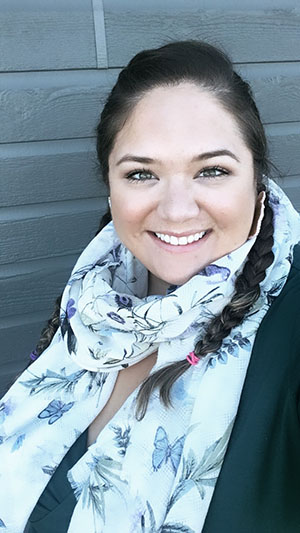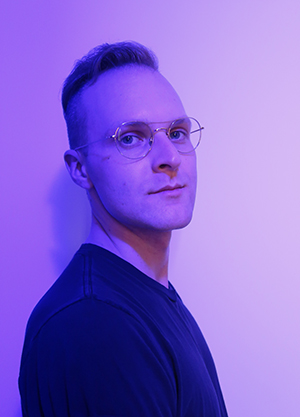Process & Possibility: Brandon Teigland in Conversation with Francine Cunningham

Francine Cunningham, whose story "Asleep Till You're Awake" appears in The Malahat Review's fall issue #212, discusses fictionalizing an emotion in order to process it, self-reflection leading to writing, and choosing to write her story in a fabulist style in her
Q&A with Malahat Review volunteer Brandon Teigland. Read an excerpt of "Asleep Till You're Awake" here.
Francine Cunningham is an award-winning Indigenous writer, artist and educator. Her debut book of poems On/Me (Caitlin Press) was nominated for a 2020 BC and Yukon Book Prize and a 2020 Indigenous Voices Award. She is a recent winner of The Indigenous Voices Award in the 2019 Unpublished Prose Category and of The Hnatyshyn Foundation’s REVEAL Indigenous Art Award. Her fiction has appeared in Grain Magazine as the 2018 Short Prose Award winner, on The Malahat Review’s Far Horizon’s Award for Short Fiction shortlist, and in Joyland Magazine, The Puritan Magazine and more. You can find out more about her at www.francinecunningham.ca.
“Asleep Till You’re Awake” deals with the physical absence of a mother. Much of the story is about living with complicated grief (an absence of grief and mourning) and having to become comfortable with leaving some questions concerning closure unanswered. Where did your inspiration come from for this story?
My inspiration for this story came from a place of processing my own grief of the death of my mother and how years later I can still be surprised by how hard it can hit in the most mundane of moments. This story is based on a true experience that I had at the doctor's office where a woman who looked, moved, and was so much of how my own mother was came into the waiting room I was waiting in and took a seat across from me. It was like the air was punched out of my body in that moment. I had to leave the office, missing my appointment, because of how strong the urge to break down and sob was. This moment took place roughly three years after my mother’s death. I immediately went home, sat down, took out a notebook, and wrote this story in one draft, and it appears almost exactly as it came out that day. For me, fictionalizing that emotion was the only way I could process it.
There is a deep need for people who don’t know where their loved ones are, physically or metaphysically, to have a memorial, i.e. an object that serves as a focus for the memory of a deceased person. The chair in the waiting room at the walk-in clinic, where we encounter the ghost-mother, seems to fill a similar function to a memorial, allowing the main character to touch base with the dead mother’s body. Can you express some of your deeper sentiments regarding the chair’s significance?
The narrator of the story never got to see her mother before she died, never got to speak to her, never got to be with her who she always wanted to be with, and she feels that sadness and regret inside of her all day every day, it’s consuming her. For her, the chair is a way of hope past that consumption, of the possibility of a time without it.
As someone who has been through and is still processing this type of grief, I also have to hold onto hope that one day I will exist without it, and I think that other people who are moving through grief share this hope. There is a mourning of the person, the time before the mourning, and a hopeful possibility of not feeling the pain anymore. This story explores all of that regret, loss, yearning, and hope.
I chose to write this story in this fabulist style because it helps to keep the reader in a state of not-knowing, which for me is grief – not knowing what’s real, what a day will feel like, what the future holds.
Throughout “Asleep Till You’re Awake,” the main character experiences recurring fits of excessive daytime sleepiness and hallucinations. How might you elaborate on your use of this narrative motif?
I wanted to give the impression that this narrator was unreliable and I felt like a narrator who, by their own admission, is falling asleep everywhere would do that. I also wanted the reader to question if the dead mother was real or not, at least the first time she was seen, and all the implications of that. I really didn’t want to make any hard truths for the narrator or the reader and I wanted to leave it up to both to determine what reality was, and if that’s even a real thing anymore. I also wanted to explore depression, in-your-bones-living-with-it-like-an-old-friend depression, and the kind of deep weariness that comes from being cloaked in depression for a long time. Being dragged down into sleep for me is one way my depression manifests when I am going through a depressive episode so I basically just wrote what I know.
You recently published a debut poetry collection, On/ME. Caitlin Press describes the book as, “an encyclopedia of Cunningham [who] explores what it means to be forced to exist within the margins.” What kind of conversations do you hope people will have after reading these poems?
I don’t necessarily hope for any kind of concrete conversations. I didn’t write the book in a way that would lead people to a certain conclusion, I wanted to leave it open enough for people to be able to fill in their own experiences. I shared parts of who I am in the book as a means to talk about bigger ideas like mental illness, death, and Indigenous identity, of which all I can speak for are my own experiences. I hope that people will find some poems that speak to them, that inspire them to write their own poems about who they are, to question aspects of their own life, or perform some introspection. I’ve had readers reach out to me after reading the book to tell me what the book has meant to them and that really means a lot to me.
You facilitate engagement across Canada with youth through writing workshops, teaching students to create zines and nature- / self-inspired poetry. Could you share a moment with us from this part of your life?
This is one of my very favourite things to do, I love working with youth and I love writing, so combining the two was a very natural thing for me. I love being in a classroom or workshop space with people, whether they’re experienced writers or people trying to tell their story for the first time. When at the end of a workshop people can walk away with a poem that didn’t exist a few hours prior, it's an amazing feeling, and my hope is that it inspires them to continue writing.
Where do you find your writing practise taking you these days? Who are you reading and what are you writing?
I am reading the short fiction collection Orange World by Karen Russel, a favourite author of mine, the novel The Grace of Kings by Ken Liu, and the nonfiction book The Mosquito: A Human History of Our Deadliest Predator by Timothy C. Winegard. I like to keep many books going at once and in different forms and structures so I can switch when I need a break.
I am actually working on the edits for a book of short stories that will be published with Invisible Press in the to-be-determined future, where this story “Asleep Till You’re Awake,” will actually appear. I am very excited for this book to enter into the world, as it's filled with the weirdness that I try and imbue my short fiction with, and will be something very different than my poetry collection. In terms of new work, I am writing a memoir, as it seems like the thing I am doing the best during the pandemic is hyper-focusing on self-reflection which lends itself, at least for me, to this sort of writing.

Brandon Teigland
* * * * * * * *









